
Overview
This article presents a comprehensive approach to selecting the ideal WordPress website design company. It underscores the critical importance of:
- Identifying specific business needs
- Evaluating design expertise
- Assessing ongoing support options
By following practical steps, such as:
- Evaluating service offerings like UI/UX design and SEO
- Reviewing portfolios that demonstrate proven success in the direct-to-consumer market
- Understanding the design process
Businesses can ensure alignment with their brand's objectives.
Introduction
Selecting the right WordPress website design company is a critical decision for any business, particularly in an environment where numerous agencies claim to enhance a brand's online presence. For direct-to-consumer (DTC) brands, understanding unique needs is vital; it lays the groundwork for a strategic partnership that fosters growth and engagement. With a myriad of options at their disposal, businesses must discern how to choose a firm that aligns with their vision and possesses the expertise to navigate the intricacies of e-commerce. This article outlines five essential steps to empower brands in making informed decisions, ensuring their website evolves into a formidable tool for success.
Identify Your DTC Brand's Specific Needs and Goals
Start by conducting a comprehensive assessment of your company’s objectives. Consider the following critical questions:
- What is the primary purpose of your website? (e.g., sales, lead generation, brand awareness)
- Who is your target audience, and what are their preferences?
- What features and functionalities do you need? (e.g., e-commerce capabilities, blog, contact forms)
- What is your budget for the project?
Document these insights meticulously to create a clear outline. This outline will serve as a for your discussions with prospective WordPress website design companies, ensuring that your objectives are aligned and effectively communicated.
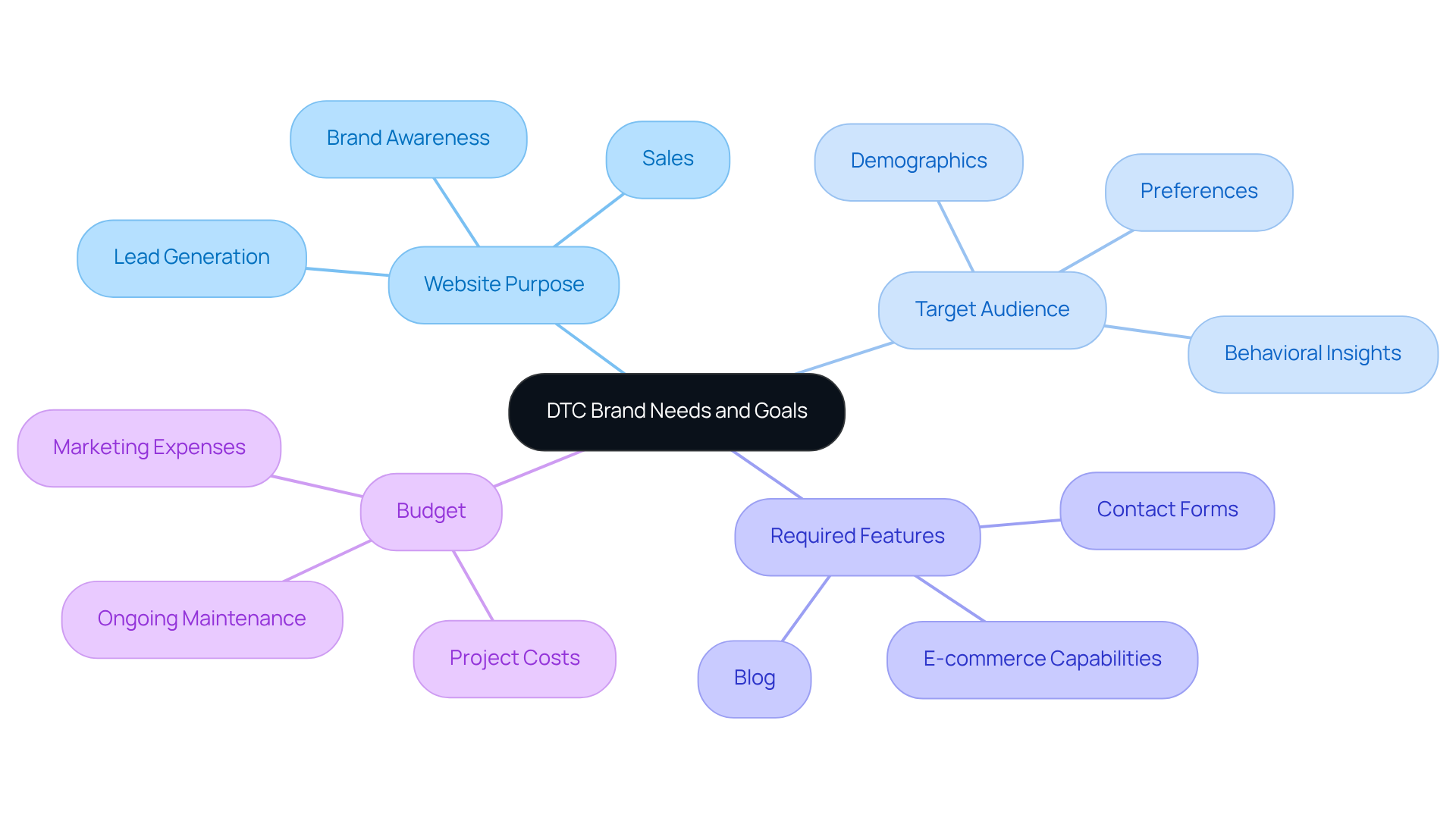
Evaluate Expertise and Services of Design Companies
When assessing potential creative firms, it is crucial to examine their specific service offerings and expertise, particularly concerning direct-to-consumer (DTC) labels. Key services to consider include:
- UI/UX Design: A well-crafted user interface and experience are essential for customer retention and boosting conversion rates. DTC companies benefit from intuitive layouts that facilitate seamless navigation and interaction. As Lisa Ross states, "DTC companies can engage with their audience in a manner traditional retail models simply cannot," underscoring the importance of effective aesthetics in building customer relationships.
- SEO: Search engine optimization is vital for enhancing visibility and attracting organic traffic. A creative agency should demonstrate a robust understanding of SEO best practices tailored for e-commerce. With the DTC market expected to grow from $135 billion in 2023 to $187 billion by 2025, implementing is more critical than ever.
- Content Creation: Engaging content is paramount for storytelling and audience interaction. Agencies must provide services that encompass copywriting and multimedia content creation to resonate with target demographics. It has been observed that "Customers who feel heard and valued are likelier to stick around, leading to more repeat business and positive word-of-mouth."
- Responsive Design: Given that a substantial portion of consumers shop via mobile devices, responsive design guarantees that websites operate optimally across all platforms, thereby enhancing user experience. Nearly half of consumers cited improved prices as their primary motivation for purchasing from DTC companies, highlighting the need for a seamless shopping experience.
- E-commerce Integration: DTC companies necessitate robust e-commerce solutions that streamline the purchasing process. Seek agencies experienced in integrating payment gateways, inventory management, and customer relationship management systems. The convenience of subscription services remains a key aspect of DTC sales, making effective e-commerce integration indispensable.
Moreover, assess whether the firm has a proven track record with DTC companies. Their familiarity with the unique challenges and opportunities within this sector can significantly influence the effectiveness of your website. For instance, successful collaborations between DTC brands and creative agencies have led to improved customer engagement and increased sales.
Evaluate their approach to creation and development. Are they leveraging the latest technologies and design trends? An organization that stays ahead of industry trends can provide innovative solutions that differentiate your label in a competitive landscape.
Ultimately, compile a list of firms that align with your specific needs and demonstrate a history of successful partnerships with DTC entities. This targeted strategy will ensure that you engage with an agency capable of delivering impactful results.
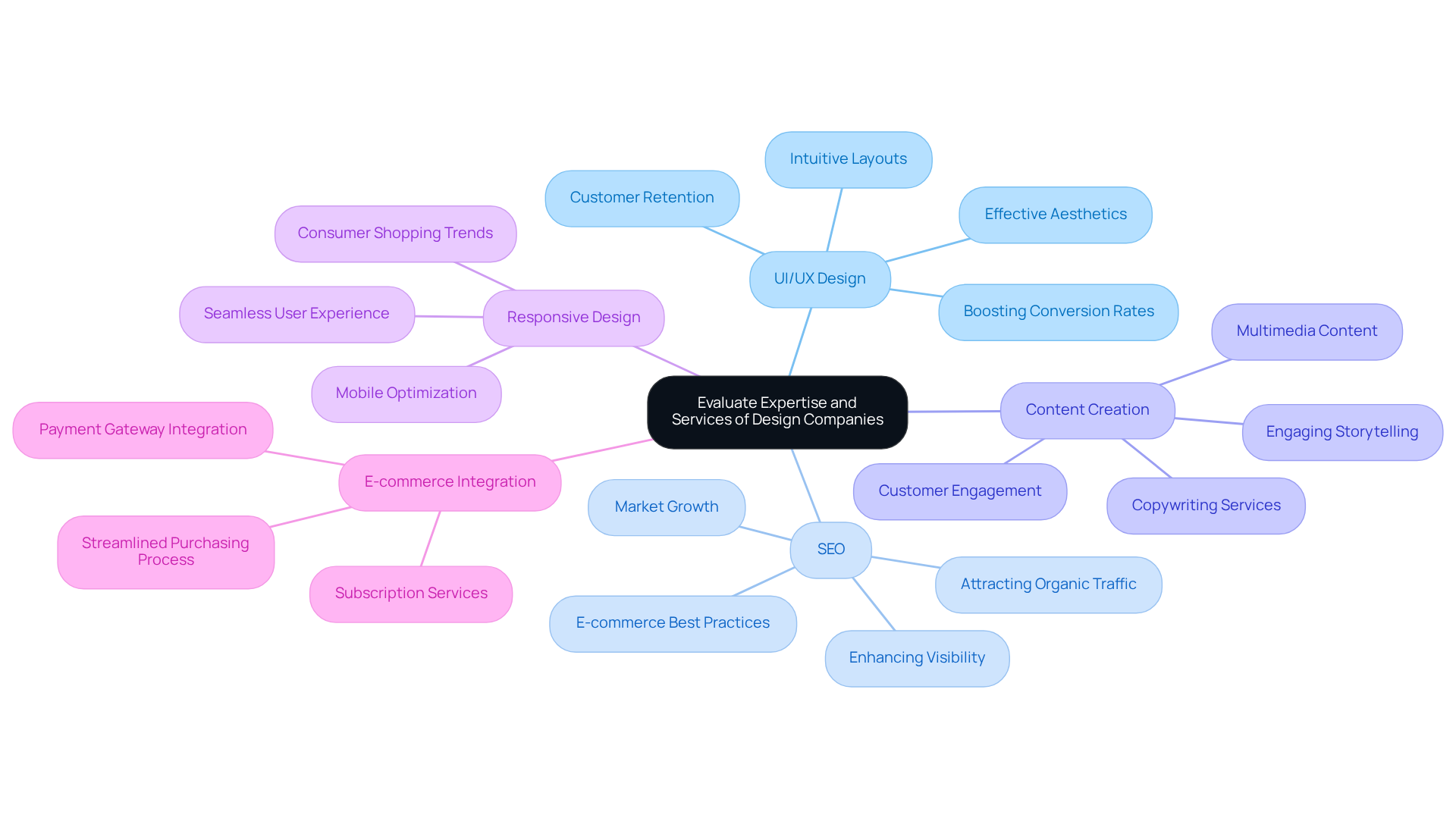
Review Portfolios and Client Testimonials
When reviewing the portfolios of selected companies, it is crucial to seek a variety of design styles and projects that align with your aesthetic. For instance, Parah Group has significantly enhanced the profitability of various DTC companies through innovative conversion rate optimization strategies. A notable case study involved a $30M apparel company that experienced a 35% increase in conversion rates and a 10% rise in revenue per visitor after implementing a redesigned homepage that emphasized social proof, minimized unnecessary pop-ups, and optimized pricing. In a similar vein, a $15M cleaning product company improved its average order value by 80% through strategic bundling, price testing, and the introduction of multi-packs to incentivize larger purchases.
These examples not only illustrate measurable results but also showcase the agency's ability to customize solutions to meet specific client needs. Furthermore, client testimonials offer valuable insights into the agency's strengths and weaknesses, particularly in areas such as communication, project management, and overall satisfaction. This feedback is essential in evaluating how effectively the agency can fulfill your expectations and contribute to your .
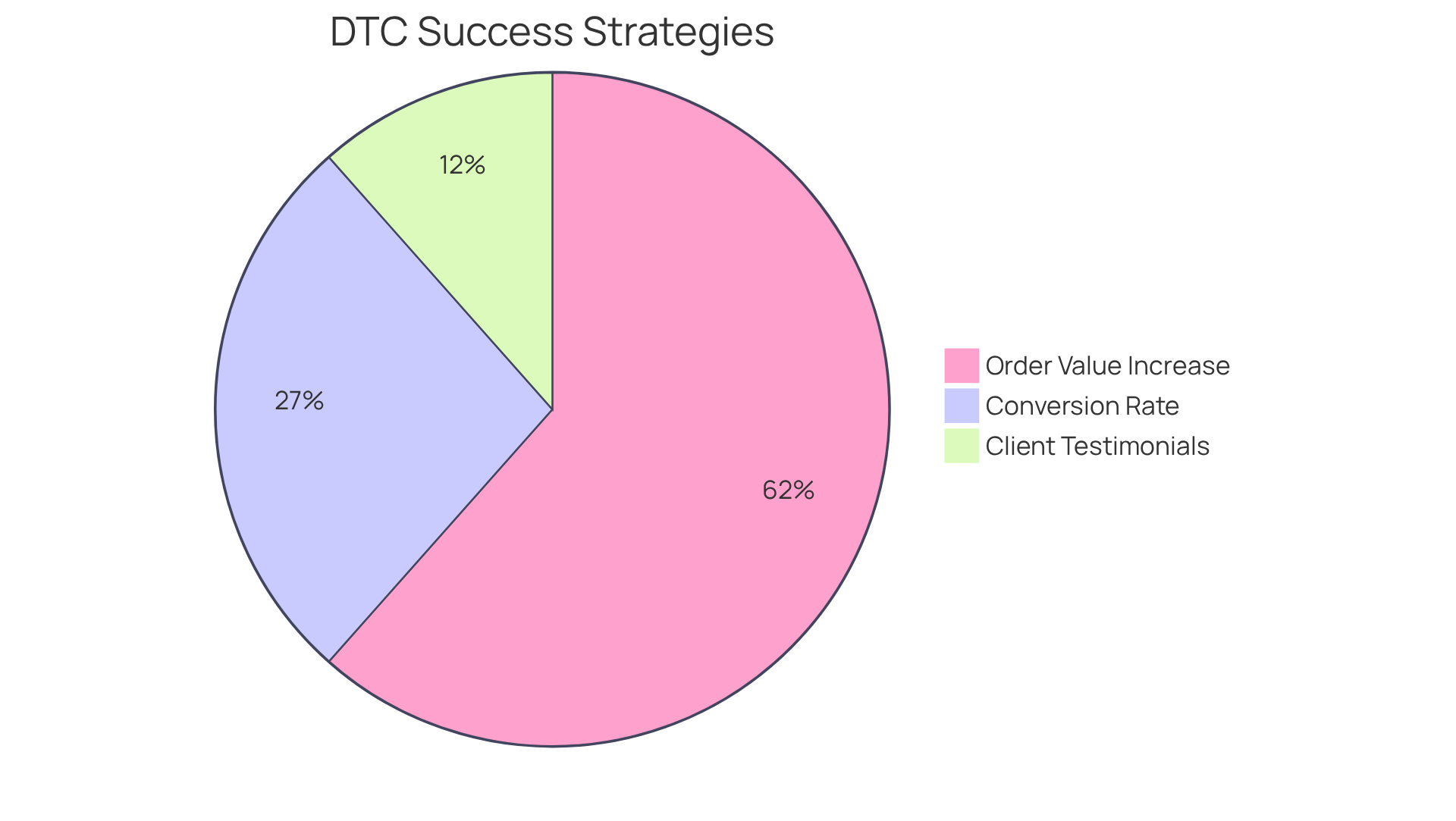
Understand the Design Process and Communication Style
Inquire about the creation process of each agency. Essential questions to consider include:
- What are the stages of the design process? (e.g., discovery, wireframing, prototyping, testing)
- How do they manage feedback and revisions?
- What tools do they utilize for ?
- How frequently will you receive updates on the project's progress?
Understanding their approach is crucial, as it will enable you to assess whether it aligns with your expectations and working style.
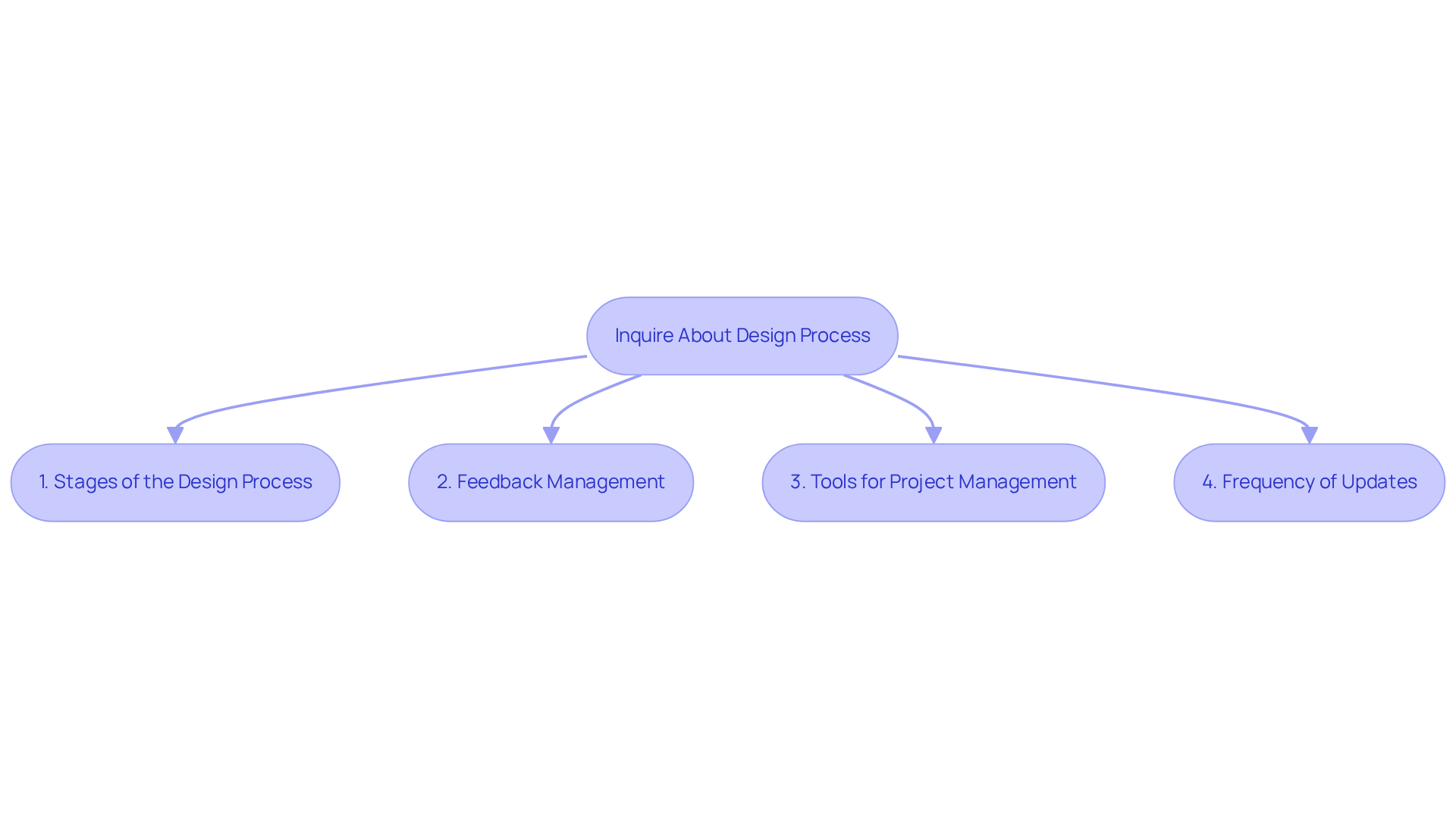
Consider Ongoing Support and Maintenance Options
When evaluating potential creative firms, it is imperative to address their . Consider the following key factors:
- Maintenance Packages: Inquire about the availability of maintenance packages and the specific services they encompass. A robust package typically includes ongoing security monitoring, software updates, content updates, backups, and technical support. These components are crucial for ensuring your website remains secure and operates effectively.
- Updates, Security, and Backups: Gain insight into how the organization manages updates and security. Regular updates are essential for optimizing website performance and safeguarding against vulnerabilities. Furthermore, confirm that they have a reliable backup system to mitigate the risk of data loss.
- Response Times for Support Requests: Investigate their average response times for support inquiries. Timely responses are vital; many clients anticipate a reply within a day of submitting a request. A design agency that prioritizes prompt support can significantly enhance your operational efficiency.
- Additional Costs: Clarify any potential extra costs related to ongoing support. Understanding the complete scope of expenses will enable you to budget effectively and avoid unforeseen charges.
Choosing a firm that delivers comprehensive support will guarantee that your website stays current and aligned with your business objectives. Notably, brands that commit to regular website maintenance have reported considerable enhancements in user experience and conversion rates, underscoring the value of these services in today's competitive e-commerce landscape.
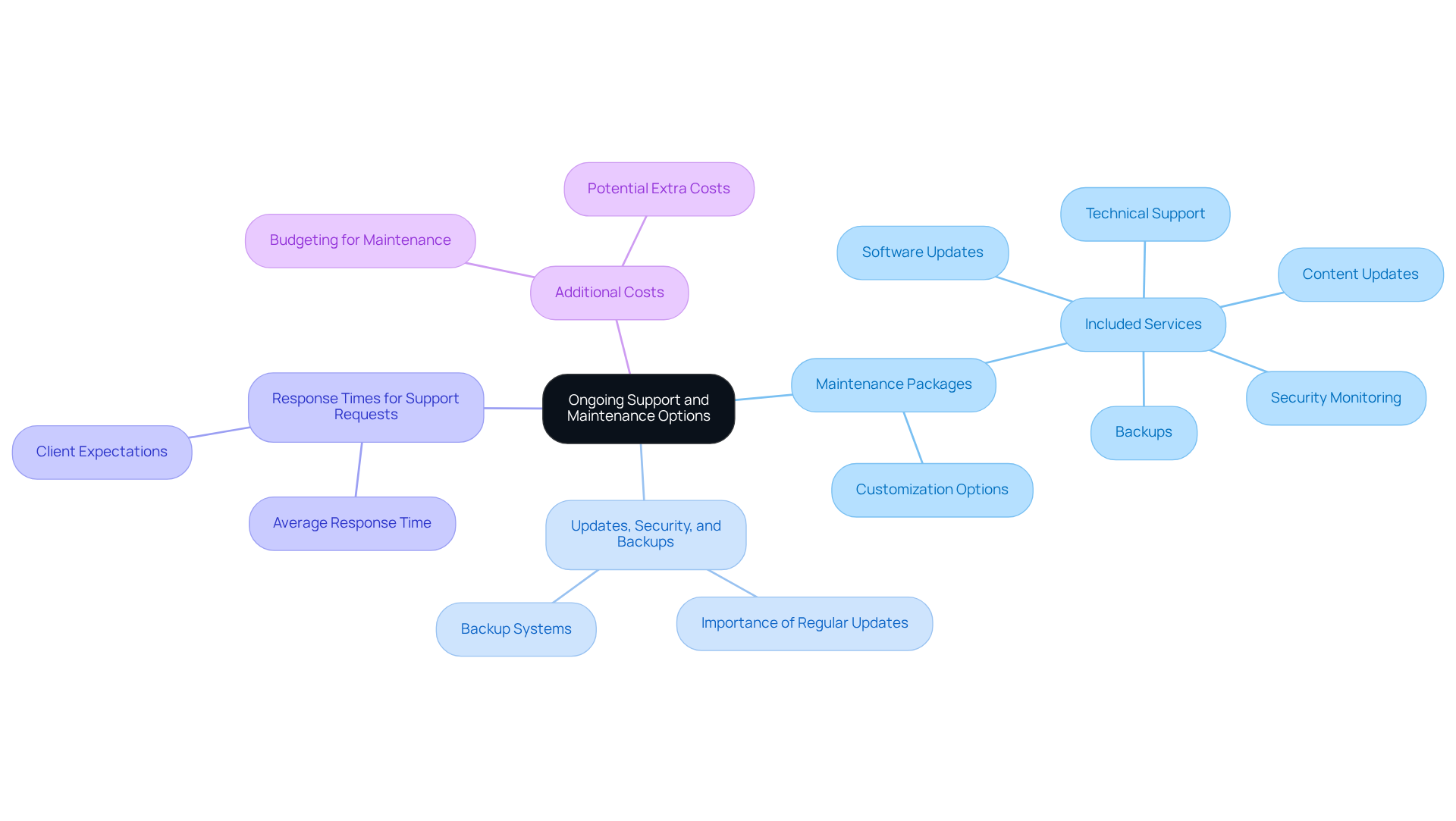
Conclusion
Choosing the right WordPress website design company is a pivotal decision that can profoundly impact the success of a direct-to-consumer (DTC) brand. By clearly identifying specific needs and goals, evaluating the expertise and services of potential design firms, and understanding their design processes and communication styles, brands can ensure they partner with an agency that aligns with their vision. Furthermore, considering ongoing support and maintenance options is essential for long-term success, as it helps maintain website performance and security.
This article has provided key insights on effectively navigating the selection process. From assessing the unique requirements of your brand to reviewing portfolios and client testimonials, each step is designed to empower brands to make informed decisions. The significance of UI/UX design, SEO, content creation, and e-commerce integration cannot be overstated, as these elements are crucial for establishing a successful online presence. Additionally, comprehending the design agency's process and ongoing support options can foster a more fruitful partnership.
In conclusion, the importance of selecting the right web design agency is paramount. A well-chosen partner can enhance user experience, boost conversion rates, and ultimately drive growth for your DTC brand. Dedicating time to carefully evaluate potential firms based on the outlined criteria will not only streamline the decision-making process but also lay the groundwork for a successful digital journey. Seize the opportunity to elevate your brand's online presence by making strategic choices that align with your goals and vision.
Frequently Asked Questions
What should I consider when identifying my DTC brand's needs and goals for a website?
You should conduct a comprehensive assessment of your company's objectives by considering the primary purpose of your website (e.g., sales, lead generation, brand awareness), your target audience and their preferences, necessary features and functionalities (e.g., e-commerce capabilities, blog, contact forms), and your budget for the project.
Why is it important to document insights about my DTC brand's needs?
Documenting these insights meticulously creates a clear outline that serves as a strategic guide for discussions with prospective WordPress website design companies, ensuring that your objectives are aligned and effectively communicated.
What key services should I evaluate when assessing design companies for my DTC brand?
Key services to evaluate include UI/UX design, SEO, content creation, responsive design, and e-commerce integration.
How does UI/UX design benefit DTC companies?
A well-crafted user interface and experience are essential for customer retention and boosting conversion rates, as they facilitate seamless navigation and interaction, allowing DTC companies to engage with their audience more effectively than traditional retail models.
Why is SEO important for DTC brands?
SEO enhances visibility and attracts organic traffic, which is critical as the DTC market is expected to grow significantly. A creative agency should demonstrate a robust understanding of SEO best practices tailored for e-commerce.
What role does content creation play for DTC companies?
Engaging content is paramount for storytelling and audience interaction. Agencies must provide services that encompass copywriting and multimedia content creation to resonate with target demographics, fostering customer loyalty and positive word-of-mouth.
What is the significance of responsive design for a DTC website?
Responsive design ensures that websites operate optimally across all platforms, enhancing user experience, especially since a substantial portion of consumers shop via mobile devices.
What should I look for in e-commerce integration for my DTC brand?
Look for robust e-commerce solutions that streamline the purchasing process, including integration of payment gateways, inventory management, and customer relationship management systems, as well as convenience features like subscription services.
How can I assess a design firm's experience with DTC companies?
Evaluate whether the firm has a proven track record with DTC companies, as their familiarity with the unique challenges and opportunities in this sector can significantly influence the effectiveness of your website.
What should I consider about a design firm's approach to creation and development?
Assess if they leverage the latest technologies and design trends, as an organization that stays ahead of industry trends can provide innovative solutions that differentiate your label in a competitive landscape.
FAQs











